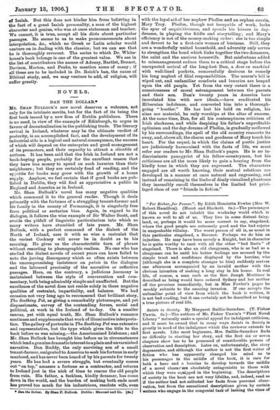NOVELS.
DAN THE DOLLAR.*
MR. SHAN BULLOCK'S new novel deserves a welcome, not only for its intrinsic merits, but for the fact of its being the first book issued by a new firm of Dublin publishers. There is no need, in view of the example of Edinburgh, to argue in favour of decentralisation in the publishing trade. The literary revival in Ireland, whatever may be the ultimate verdict of posterity, is an accomplished fact, and the development of its industrial side is a logical and natural consequence, the success of which will depend on the enterprise and good management of its promoters, and their capacity to attract a clientde of authors. It has been said that the Irish in Ireland are not a book-buying people, probably for the excellent reason that they have less money to spend on such luxuries than their neighbours ; but they are certainly fond of reading, and the appetite for books may grow with the growth of a home supply. Anyhow, we feel certain that if good books are pub- lished in Dublin, they will find as appreciative a public in England and America as in Ireland.
Mr. Shan Bullock's novel has many negative qualities which commend it to the general reader. Though it deals primarily with the fortunes of a struggling tenant-farmer and his family in the county of Fermanagh, it is singularly free from political or sectarian bias. Again, in regard to its dialogue, it follows the wise example of Sir Walter Scott, and avoids the pitfall of linguistic particularism into which so many writers have stumbled of late years. Mr. Shan Bullock, with a perfect command of the dialect of the North of Ireland, uses it with so wise a restraint that the veriest Cockney will never be in doubt as to his meaning. He gives us the characteristic turn of phrase without resorting to phonographic realism. No one who has studied the dialect novels of recent years can have failed to note the jarring discrepancy which so often exists between the uncompromising insistence on patois in the dialogue and the laboured preciosity of the narrative or reflective passages. Here, on the contrary, a judicious .harmony is maintained between the style of conversation and com- mentary, both being admirably simple and unaffected. But the excellence of the novel does not reside solely in these negative qualities of restraint, impartiality, and balance. We had occasion not very long ago to recommend that brilliant story, The Seething Pot, as giving a remarkably picturesque, and yet dispassionate, survey of the contending forces, social and political, at work in the Ireland of to-day. On a smaller canvas, yet with equal truth, Mr. Shan Bullock's romance continues and supplements that work of illuminative interpreta- tion. The gallery of portraits in The Seething Pot was extensive and representative, but the type which gives the title to the book before us was missing,—the Americanised Irishman ; and Mr. Shan Bullock has brought him before us in circumstances which lend a genuine dramatic interest to a plain and unvarnished narrative. Dan Ruddy, the only surviving son of a small tenant-farmer, emigrated to America to seek his fortune in early manhood, and has never been heard of by his parents for twenty years. He has had a severe struggle, but eventually comes out "on top," amasses a fortune as a contractor, and returns to Ireland just in the nick of time to rescue the old people from ruin. His father, a feckless, kindly dreamer, has come down in the world, and the burden of making both ends meet has proved too much for his industrious, resolute wife, even • Dan Use Dollar. By Shan F. Bullock Dublin Maunsel and Co. Os.] with the loyal aid of her nephew Phelim and an orphan cousin, Mary Troy. Phelim, though not incapable of work, lacks the spur of acquisitiveness, and spends his leisure in day- dreams, in playing the fiddle and storytelling ; and Mary's efficiency is not of the money-making order : she is too simple and devout to be a first-rate woman of business. Still, they are a wonderfully united household, and adversity only serves to strengthen the bond which links together the two dreamers, the saint and the anxious housewife. But misfortune added to mismanagement reduce them to a critical stage before the unexpected arrival of the long-lost Dan, a dens en niachind, with well-lined pockets, remorsefully desirous to remedy his long neglect of filial responsibilities. The usurer's bill is wiped out, and unfamiliar comforts and luxuries are heaped upon the old people. Yet from the very outset there is a consciousness of moral estrangement between the parents and their son. Dan's twenty years in America have inoculated him with new ideals,—have eradicated his Hibernian indolence, and converted him into a thorough- going " hustler." He has lost his hold on religion, his aims are material, he only worships at the altar of success. At the same time, Dan, for all his contemptuous criticism of Irish slackness, and while despising his father's unprofitable optimism and the day-dreams of Phelim, is gradually mellowed by his surroundings, the spell of the old country reasserts its sway, and, above all, the charm and goodness of Mary touch his heart. For the sequel, in which the claims of poetic justice are judiciously harmonised with the facts of life, we must refer our readers to Mr. Shan Bullock's pages. He is no in- discriminate panegyrist of his fellow-countrymen, but his criticisms are all the more likely to gain a hearing from the kindly tone in which they are expressed. The characters engaged are all worth knowing, their mutual relations are developed in a manner at once natural and engrossing, and instead of remaining in the limbo of dimly visualised phantoms they insensibly enroll themselves in the limited but privi- leged class of our "friends in fiction."










































 Previous page
Previous page